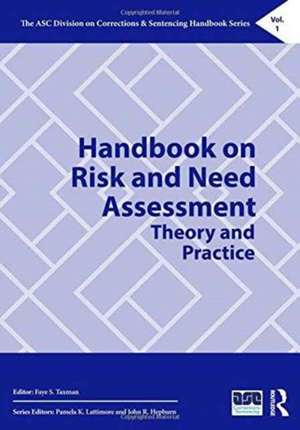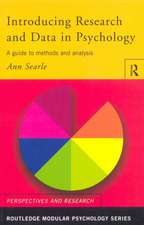Handbook on Risk and Need Assessment: Theory and Practice: The ASC Division on Corrections & Sentencing Handbook Series
Editat de Faye Taxmanen Limba Engleză Hardback – 25 oct 2016
The ASC Division on Corrections & Sentencing Handbook Series will publish volumes on topics ranging from violence risk assessment to specialty courts for drug users, veterans, or the mentally ill. Each thematic volume focuses on a single topical issue that intersects with corrections and sentencing research.
| Toate formatele și edițiile | Preț | Express |
|---|---|---|
| Paperback (1) | 433.15 lei 6-8 săpt. | |
| Taylor & Francis – 2 oct 2019 | 433.15 lei 6-8 săpt. | |
| Hardback (1) | 1219.76 lei 6-8 săpt. | |
| Taylor & Francis – 25 oct 2016 | 1219.76 lei 6-8 săpt. |
Preț: 1219.76 lei
Preț vechi: 1636.28 lei
-25% Nou
Puncte Express: 1830
Preț estimativ în valută:
233.39€ • 244.34$ • 193.12£
233.39€ • 244.34$ • 193.12£
Carte tipărită la comandă
Livrare economică 05-19 aprilie
Preluare comenzi: 021 569.72.76
Specificații
ISBN-13: 9781138927766
ISBN-10: 1138927767
Pagini: 492
Ilustrații: 64
Dimensiuni: 178 x 254 x 30 mm
Greutate: 1.02 kg
Ediția:1
Editura: Taylor & Francis
Colecția Routledge
Seria The ASC Division on Corrections & Sentencing Handbook Series
Locul publicării:Oxford, United Kingdom
ISBN-10: 1138927767
Pagini: 492
Ilustrații: 64
Dimensiuni: 178 x 254 x 30 mm
Greutate: 1.02 kg
Ediția:1
Editura: Taylor & Francis
Colecția Routledge
Seria The ASC Division on Corrections & Sentencing Handbook Series
Locul publicării:Oxford, United Kingdom
Cuprins
- The Value and Importance of Risk and Need Assessment in Corrections & Sentencing: An Overview of the HandbookFaye S. Taxman, George Mason University
Amy Dezember, George Mason University
History of RNA - Risk and Needs Assessment in Probation and Parole: The Persistent Gap Between Promise and Practice
William D. Burrell - The Research Director Perspective on the Design, Implementation, and Impact of Risk Assessment and Offender Classification Systems in USA Prisons: A National Survey
James Byrne, University of Massachusetts, Lowell
Amy Dezember, George Mason UniversityMethodological Issues in Creating and Validating RNA - Static Risk Factors and Criminal Recidivism
Robert Brame, University of South Carolina - Accuracy of Risk Assessment in Corrections Population Management: Where's the Value Added?
James Hess, University of California, Irvine
Susan Turner, University of California, Irvine - Improving the Performance of Risk Assessments: A Case Study on the Prediction of Sexual Offending among Juvenile Offenders
KiDeuk Kim, The Urban Institute
Grant Duwe, Minnesota Department of Corrections - Using Predictive Analytics and Machine Learning to Improve the Accuracy and Performance of Juvenile Justice Risk Assessment Instruments: The Florida Case Study
Ira M. Schwartz, Consultant and Advisor to Algorhythm
Peter York, Founder and CEO of Algorhythm
Mark Greenwald, Director of Research, Florida Department of Juvenile Justice and Doctoral Student at Florida State University
Ana Ramos-Hernandez, Data Manager, Algorhythm
Lisa Feeley, Research Analyst, ICF International - An Alternative Scientific Paradigm for Criminological Risk Assessment: Closed or Open Systems, or Both?
Tim Brennan, Northpointe, Inc.Dynamic Risk Factors and Responsivity Toward Different Populations - Risk, Need, and Responsivity in a Criminal Lifestyle
Glenn D. Walters, Kutztown University - Gender-Responsive Risk and Need Assessment: Implications for the Treatment of Justice-Involved Women
Emily J. Salisbury, University of Nevada, Las Vegas
Breanna Boppre, University of Nevada, Las Vegas
Bridget Kelly, University of Nevada, Las Vegas - Advancing Sexual Offender Risk Assessment: Standardized Risk Levels Based on Psychologically Meaningful Offender Characteristics
R. Karl Hanson, Public Safety Canada
Guy Bourgon, Public Safety Canada - Incorporating Procedural Justice and Legitimacy into the RNR Model to Improve Risk-Need Assessment
Katherine Ginsburg-Kempany, Arizona State University
Kimberly A. Kaiser, Arizona State University - Adoption of Risk Tools to Employment Context
Garima Siwach, University at Albany (SUNY)
Shawn D. Bushway, University at Albany (SUNY) - Exploring How to Measure Criminogenic Needs: Five Instruments and No Real Answers
Brittney Via, George Mason University
Amy Dezember, George Mason University
Faye Taxman, George Mason UniversityRNA Implementation and Practice - Customizing Criminal Justice Assessments
Zachary Hamilton, Washington State University
Elizabeth Thompson Tollefsbol, Washington State University
Michael Campagna, Washington State University
Jacqueline van Wormer, Washington State University - Risk/Need Assessment Tools and the Criminal Justice Bureaucrat: Reconceptualizing the Frontline Practitioner
Joel Miller, Rutgers University
Sarah Trocchio, Rutgers University - Risky Needs: Risk Entangled Needs in Probation Supervision
Danielle S. Rudes, George Mason University
Jill Viglione, University of Texas, San Antonio
Kimberly S. Meyer, George Mason UniversitySpecial Issues Regarding the Conceptualization for RNA - Purpose and Context Matters: Creating a Space for Meaningful Dialogues about Risk and Need
Kelly Hannah-Moffat, Director Centre for Criminology & Sociolegal Studies, University of Toronto, Canadiana Gallery - Human Rights and High Risk Offenders: The Right to Rehabilitation and the Right to Fairness
Mary Rogan, Barrister-at-Law, Head of Law and Assistant Head of the School of Languages, Law and Social Sciences, Dublin Institute of Technology
Notă biografică
Faye S. Taxman, PhD, is a University Professor in the Criminology, Society, and Law program at George Mason University in Fairfax, VA, and director of its Center for Advancing Corrections Excellence. A well-regarded scholar and researcher, she is Past Chair of the American Society of Criminology's Division on Corrections & Sentencing.
Recenzii
Risk and need assessment has been one of academic criminology’s biggest achievements and biggest disappointments. Although assessment tools are ubiquitous across correctional systems, they have fundamentally failed, to date, to alter the culture of correctional practice. In this urgent new volume, the most important and influential assessment researchers take stock of the successes, failures and futures of the practice, exploring both the evolving science of risk prediction and the art of implementation. A most promising start to the new DCS Handbook Series. – Shadd Maruna, Professor of Criminology, University of Manchester, UK
Accurate assessment of offender risks and needs is the bedrock of efforts to improve public safety. This handbook provides a critical foundation for advancing science and policy by illuminating the tremendous progress in assessment that has occurred. It is a must-read for anyone seeking to create a safer and more just society. – Daniel P. Mears, Ph.D., Mark C. Stafford Professor of Criminology, Florida State University College of Criminology and Criminal Justice
At virtually every stage of the justice system, new methods are being employed that enable decision-makers to use risk to the public as a criterion for justice system control. Yet even as these methods diversify, the empirical foundation for risk assessment remains a work-in-progress. Too little is known about the practical significance of risk as a core justice construct and the corresponding operational significance of risk assessment as a technique. This collection brings together superb studies of risk in the correctional system, both as an idea and as a practice. It is a welcome new contribution to our understanding of the most important development in the current generation of tools for the justice professions: risk assessment. – Todd R. Clear, University Professor of Criminal Justice, Rutgers University-Newark
The major strength of the Handbook on Risk and Needs Assessment is that it provides researchers and practitioners with a comprehensive collection of chapters that helps chart the topic from its history to the implications for practice and policy. It is a must have for anyone working or studying in the field of corrections. – Edward Latessa, Professor and Director, University of Cincinnati
One of the most intense activities by the many agencies responsible for managing accused or convicted offenders these days is assessment of their needs and of their treatment needs, especially for addiction or mental illness, or their risk in the community, whether that be on pre-trial release rather than bail, sentencing, and parole or probation release or recommitment decisions. This volume has pulled together a rich array of chapters from the wide variety of perspectives involved in assessing risk and needs from both methodological and implementation perspectives.
– Alfred Blumstein, J. Erik Jonsson University Professor Emeritus, Heinz College, Carnegie Mellon University
Accurate assessment of offender risks and needs is the bedrock of efforts to improve public safety. This handbook provides a critical foundation for advancing science and policy by illuminating the tremendous progress in assessment that has occurred. It is a must-read for anyone seeking to create a safer and more just society. – Daniel P. Mears, Ph.D., Mark C. Stafford Professor of Criminology, Florida State University College of Criminology and Criminal Justice
At virtually every stage of the justice system, new methods are being employed that enable decision-makers to use risk to the public as a criterion for justice system control. Yet even as these methods diversify, the empirical foundation for risk assessment remains a work-in-progress. Too little is known about the practical significance of risk as a core justice construct and the corresponding operational significance of risk assessment as a technique. This collection brings together superb studies of risk in the correctional system, both as an idea and as a practice. It is a welcome new contribution to our understanding of the most important development in the current generation of tools for the justice professions: risk assessment. – Todd R. Clear, University Professor of Criminal Justice, Rutgers University-Newark
The major strength of the Handbook on Risk and Needs Assessment is that it provides researchers and practitioners with a comprehensive collection of chapters that helps chart the topic from its history to the implications for practice and policy. It is a must have for anyone working or studying in the field of corrections. – Edward Latessa, Professor and Director, University of Cincinnati
One of the most intense activities by the many agencies responsible for managing accused or convicted offenders these days is assessment of their needs and of their treatment needs, especially for addiction or mental illness, or their risk in the community, whether that be on pre-trial release rather than bail, sentencing, and parole or probation release or recommitment decisions. This volume has pulled together a rich array of chapters from the wide variety of perspectives involved in assessing risk and needs from both methodological and implementation perspectives.
– Alfred Blumstein, J. Erik Jonsson University Professor Emeritus, Heinz College, Carnegie Mellon University
Descriere
The Handbook on Risk and Need Assessment: Theory and Practice, the first volume in the ASC Division on Corrections & Sentencing Handbook Series, covers risk assessments for individuals being considered for parole or probation. Evidence-based approaches to such decisions help take the emotion and politics out of community corrections. As the United States begins to back away from ineffective, expensive policies of mass incarceration, this handbook will provide the resources needed to help ensure both public safety and effective rehabilitation of offenders.




















